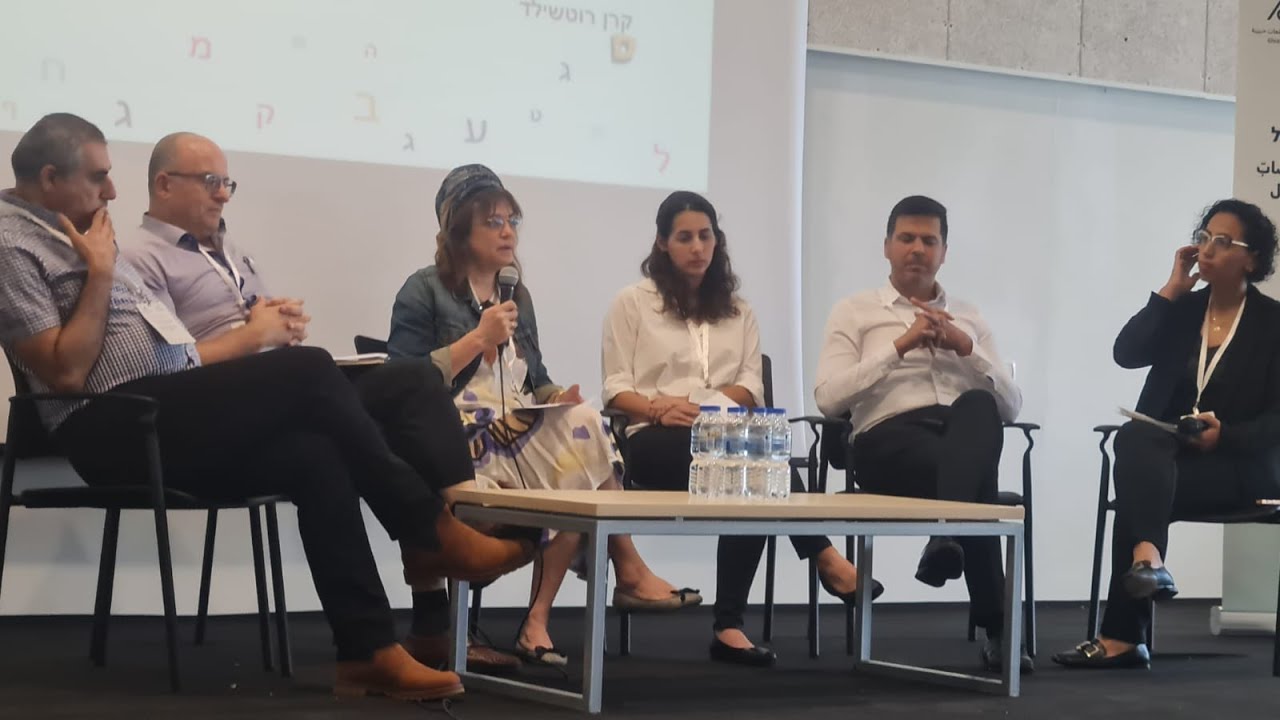
June 2, 2024
Friends of Givat Haviva May 2024 Newsletter
A Message from CEO Michal Sella
Dear Friends,
This year has been unlike any we could have imagined. We never anticipated that this academic year would conclude with hostages still in captivity, the terrible ongoing war in Gaza, and tens of thousands of evacuees without homes and facing an uncertain future.
Despite these harsh realities, dozens of Israeli students—both Arab and Jewish—and students from around the world chose to continue their studies in Israel at Givat Haviva International School, YOUNITED. Their successful completion of their studies reminded us that those working in education, who engage with young minds daily, possess a unique privilege: hope. We have the opportunity to witness new generations pursue education in the name of equality and justice, capable of handling complexity and living together even during times that challenge the resolve of adults around them. Givat Haviva International School, which reopened just a week after October 7, may have been the only shared educational framework operating for Jewish and Arab youth in Israel at that time. Our students, some of whom lost family members in Israel and Gaza, returned to campus, seeing it as the only place to cope with fear and loss.
As you will see in this update, we have continued our activities to strengthen shared society with universities and colleges across the nation. We held a groundbreaking conference in cooperation with the University of Haifa on the topic of the Hebrew language for Arab society. The critical challenge for the integration of Arabs in Israel is Hebrew fluency. The lack of proficiency in spoken Hebrew is a significant barrier for young Arab men and women in Israel, in academia, employment, and in daily life. Without these language skills, talented young Arabs cannot realize their potential and contribute fully to society.
Additionally, we proudly hosted a unique conference on the impact of the current crisis on art and culture. We learned that deep pain cuts across communities, silencing Arab artists and forcing Jewish artists to censor themselves.
I wish for all of us some normalcy before the summer. May the hostages return, the fighting cease, and everyone be able to return to their homes to begin the much-needed work of rehabilitation.
Michal Sella
Executive Director
Jewish-Arab Center for Peace: Hebrew Language and the Young generation in Arab Society Conference
Lack of proficiency in Hebrew significantly hinders the integration of young Arabs into the labor market, academia, and Israeli society. Most Arab students fail to achieve the minimum score in the Hebrew language proficiency test required for undergraduate studies.
In response, the "Hebrew Language and the Young Generation of Arab Society in Israel" conference was held at Haifa University on May 8, initiated by the Jewish-Arab Peace Center at Givat Haviva and the Diversity, Inclusion, and Community Unit at the University of Haifa.
Educators, senior representatives of government ministries, civil society organizations, researchers, and academics heard in-depth research presentations and engaged in direct dialogue with policymakers. Four expert position papers provided detailed analysis and practical recommendations for improving Hebrew proficiency among Arab students.
In her keynote lecture, Dr. Marian Tehawkho presented alarming data from a survey of sixth-grade students, showing that 56% of Arab students do not use Hebrew outside of school. She criticized the Arab education system’s lack of uniformity in measuring Hebrew knowledge and the lack of coordination between schools, universities, and vocational institutions.
Tehawkho also offered data from a policy paper of the Aharon Institute at Reichman University from 2020, which she co-authored with Idit Kalisher and Ido Moshkalev, showing that:
-
Among the Arab population in Israel, there is a positive correlation between the knowledge of Hebrew, the salary level, and an increase in the chance of finding employment.
-
The average salary of Arab men proficient in Hebrew is 19.7% higher than their non-proficient counterparts.
-
The average salary of Arab women proficient in Hebrew is 20.2% higher than their non-proficient counterparts.
-
Improving the level of Hebrew proficiency among the Arab population of prime working age would increase the annual GDP by 1.27 billion NIS.
Tehawkho noted that, despite a slight improvement in the situation, the proportion of Arab men proficient in Hebrew has decreased since 2016.
Speakers at the conference identified central failures in Hebrew teaching within the Arab education system, including the separation of Arabic and Hebrew education systems, insufficient teacher training, lack of exposure to Hebrew outside of school, and content irrelevant to students' lives.
Hadar Fox, the education representative in the budget division of the Ministry of Finance, stated that "only in recent years have the tools been created to measure the knowledge of Hebrew through all stages” and added that "many times there is a disconnect between the plans of the Ministry of Education and what happens in the classrooms."
The director of Division A in Arab Education at the Ministry of Education, Shirin Hafi-Natur, completely agreed that "something has not been working thus far." She stated that there is a problem coordinating expectations and that "Hebrew was seen as a field of knowledge and not as a tool for communication." Hafi-Natur announced the Ministry’s intention to submit to the government a proposal for a resolution regarding Hebrew studies, emphasizing the need for change in both conception and pedagogy.
The conference was an important step in raising awareness of the urgent need to improve Hebrew studies in Arab society and a call for action and cooperation between all relevant parties while outlining needed pedagogical and conceptual changes. This is critical to guaranteeing a better future for Arabs in Israel.
"The Muses Are Not Silent" Conference: Art, Jews, and Arabs in Times of War and Crisis
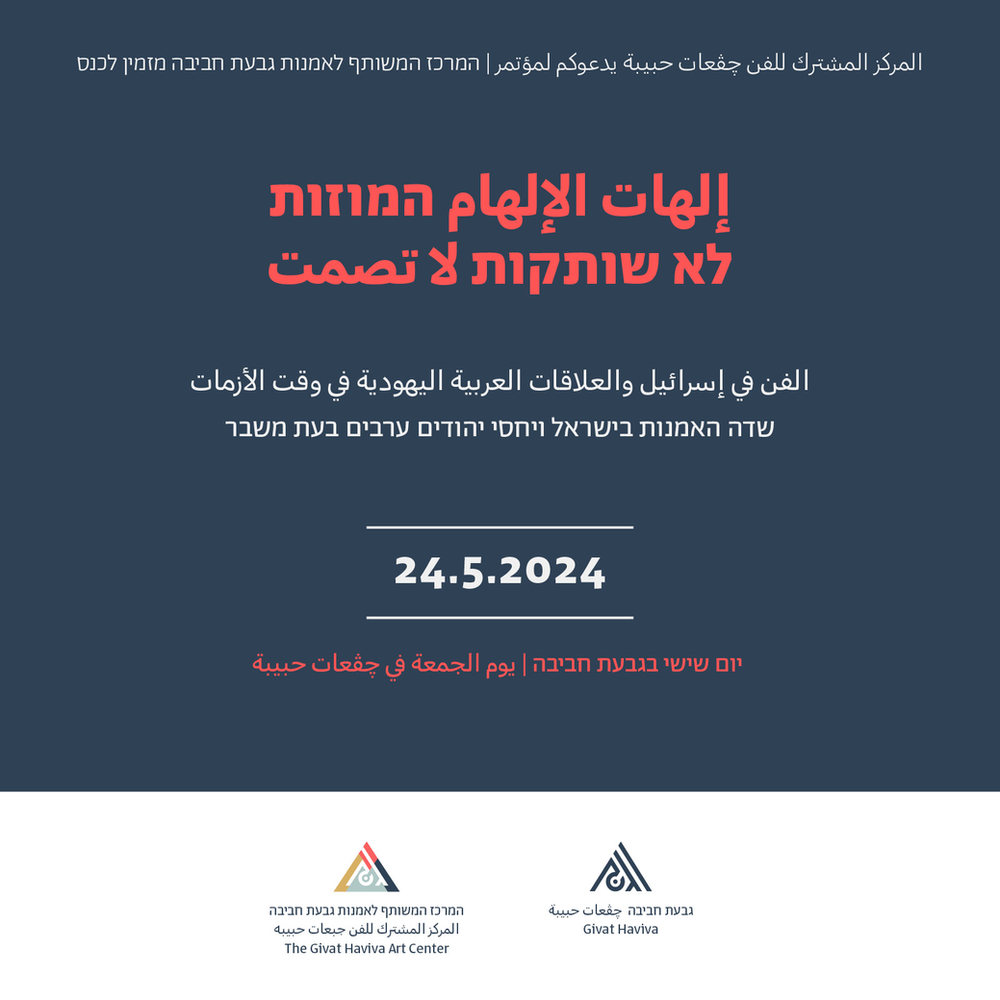
The Givat Haviva Shared Art Center on May 18 hosted "The Muses Are Not Silent" conference, which tackled the crucial question of art's role during wartime while fostering a safe and open space for expression and dialogue between the Israeli Jewish and Arab art communities.
Michal Sella, CEO of Givat Haviva, emphasized the need for inclusivity and spaces for free expression: "We engage in art, art education, and the promotion of young artists—Jewish and Arab—because we believe in providing space for expression and opportunities for cross-fertilization, acquaintance, and learning; to open doors and create equal opportunities in every field, including art."
Anat Lidror, Director of the Shared Art Center, highlighted art's role in exposing complexity during polarized times in Israel as well as globally: “This field carries within it the freedom for a fundamental and deep change of insight and awareness, a change that is possible when you really get out of the box, old orders and manage to imagine differently.”
The highlight of the conference was a conversation between two remarkable artists, Palestinian Hanan Abu Hussein and Israeli Yael Bartana. We learned that the deep pain across communities is silencing Arab artists and forcing Jewish artists to self-censor their expressions of solidarity with Gaza's suffering, a commonality we must address together.
A panel discussion on the power and role of artists in times of war and crisis offered a glimpse into the complex world of culture. Farid Abu Shakra, an artist, researcher, and activist, spoke about breaking the cycle of victimhood, emphasizing that, as an Arab Israeli citizen, he no longer wants to live as a victim.
Dalit Matityahu, Senior Curator of Israeli Art at the Tel Aviv Museum, pointed out the symmetrical policies in Israel and Gaza, both claiming victimhood—a fascinating but painful reflection.
Alaa Dakka, an Arab actor and singer, warned about the dangers of new laws and reforms passed under the radar during the war.
Sabrin Hogirat from the Ministry of Culture promised to support initiatives encouraging dialogue and joint action between Jews and Arabs in the arts.
The event reinforced the importance and power of art in creating dialogue and addressing societal issues, both within Israel and internationally.
Michal Sella, CEO, at the international Peace Symposium in Vienna
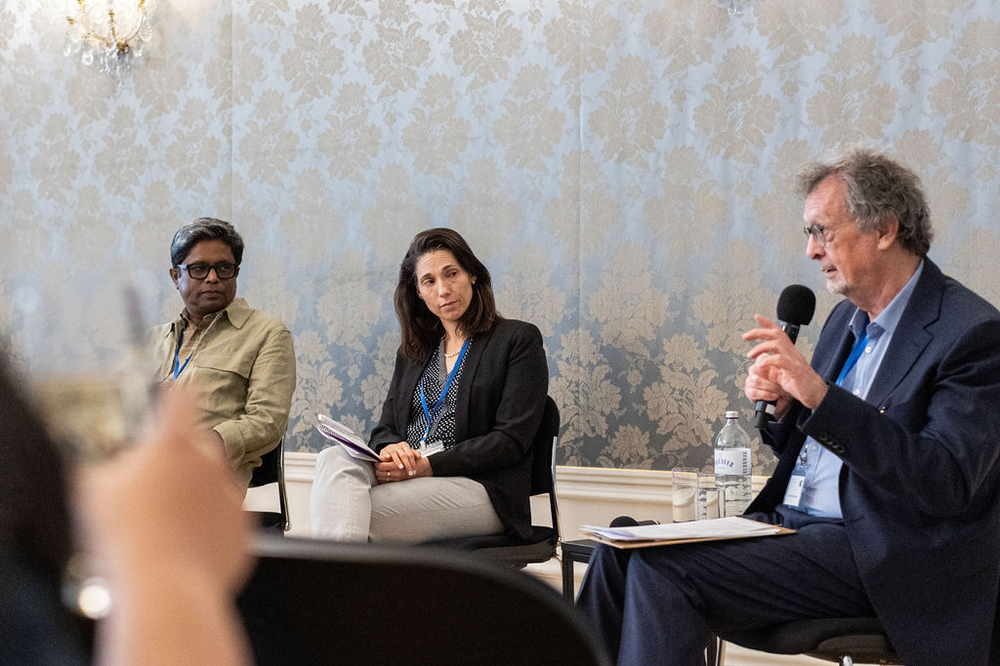
Michal Sella participated in the "Global Perspectives on Peace in Times of Conflict" symposium in Vienna, sponsored by the Jewish Museum in Vienna and the Salzburg Global Seminar. The event brought together leaders, politicians, and civil society organizations from conflict zones worldwide. A new peace exhibition at the Jewish Museum in Vienna displayed the UNESCO Peace Education Award given to Givat Haviva in 2001.
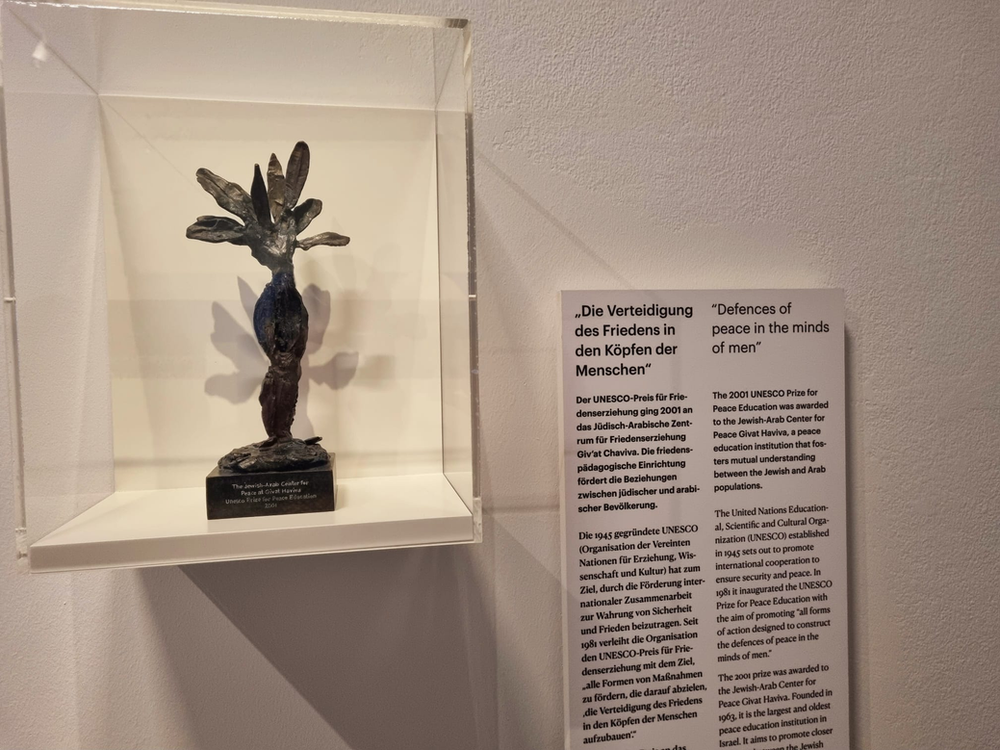
Courses in Spoken Arabic for Gynecology Specialists and More
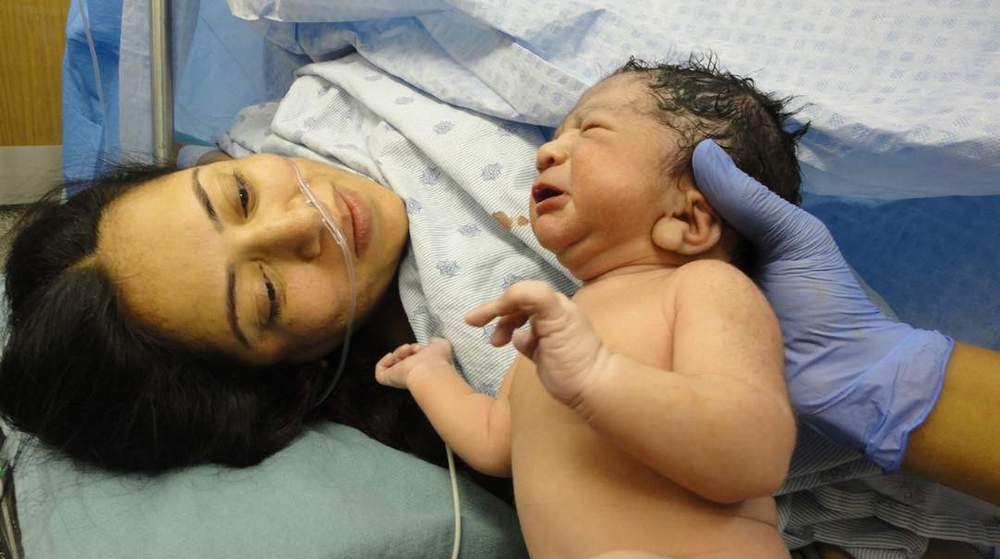
"She came to give birth with her mother. She didn't know Hebrew. Her husband is on the way. No one on shift knew Arabic, and the Jewish woman who studied at Givat Haviva wasn’t there. We decided that this is it..."
Discouraging situations like this, in which an Arab mother arrives in the delivery room without knowing Hebrew, and none of the staff speak Arabic, are a daily reality in hospitals in Israel. These situations pose a significant challenge to the medical staff, who find it difficult to effectively fulfill their role in treating patients.
The Institute for Arabic Studies in Givat Haviva took the situation seriously and responded to requests from the field. In May, we opened three online courses for specialist doctors, gynecologists, and midwives.
The doctors learn spoken Arabic, emphasizing terms relevant to the field, and practice simulations of meetings with Arab birthing mothers, taking into account linguistic nuances and the patients’ cultural context.
Samia Mahamid says, "I am personally excited. I remember when I gave birth, and I feel a great honor to contribute to improving the experience of Arab mothers with their doctors. In these special moments, communication and a common language are critical."
The Institute for Arabic Studies has been working for many years to make the Arabic language accessible to diverse professional fields.
News in Brief
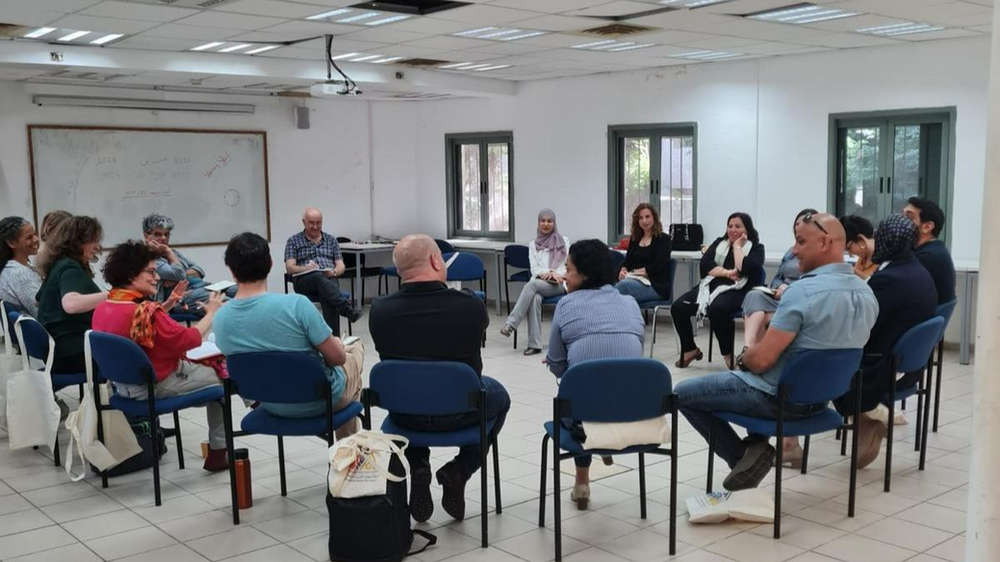
A course on leading dialogue groups among teenagers, in cooperation with the Hebrew University's Magid Institute, started this month at Givat Haviva.
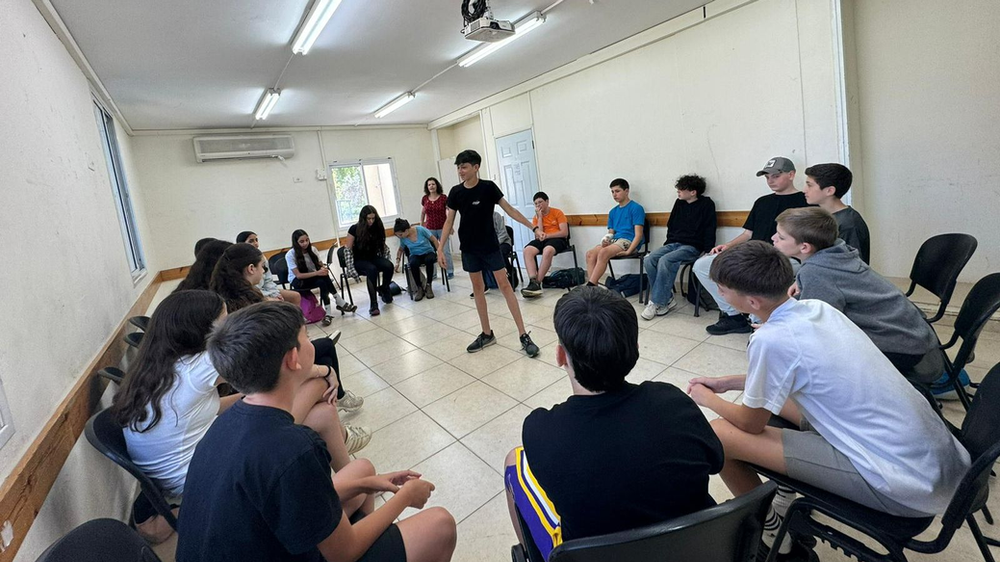
This month, in the Children Teaching Children program, the students of Ort Shahar Pardes Hana High School experienced a complex and productive discussion about October 7 and Jewish-Arab relations since the beginning of the war.

Teachers in our training program, “Partners on the Path,” met in a final two-day seminar in Hadera.
YOUNITED- Givat Haviva International School
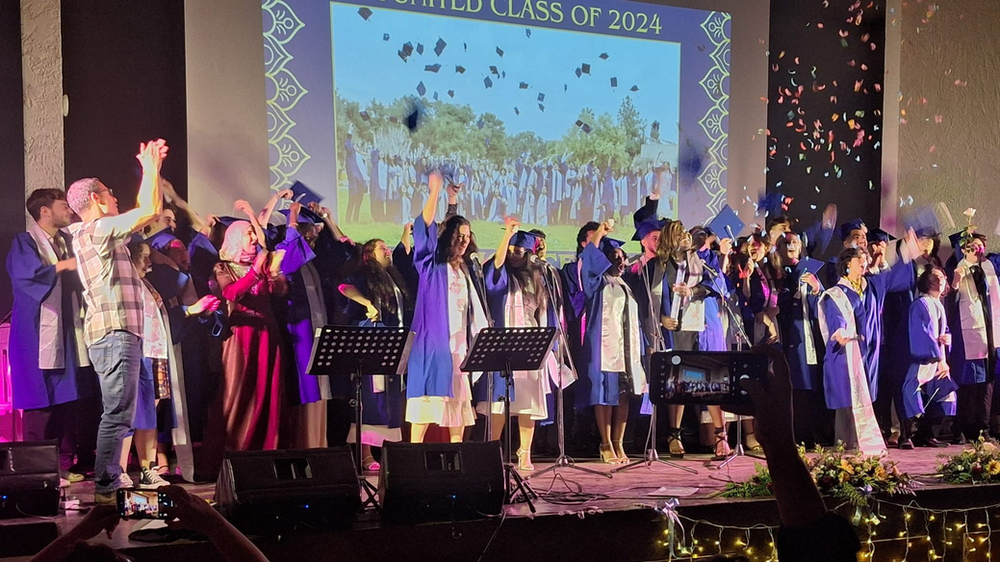
YOUNITED International School’s 12th graders celebrated their graduation with a series of exciting events, culminating in a festive ceremony attended by the community, parents, and guests from around the world.
The graduates emphasized the values of Jewish-Arab partnership and friendship and their sense of Givat Haviva as a second home. The school's innovative pedagogical approach, focused on creating a stable and respectful community framework with spaces for dialogue, proved particularly successful during the war. This success was recognized by the Ministry of Education, and the school is seen as a model for shared living education even in times of crisis.
We wish the graduates much success in their future endeavors and look forward to their continued involvement with Givat Haviva.
For details and registration for the next academic year, contact the Admissions Office:
+972 (4) 617-4427 | admissions@givathaviva.org.il
As always, we are so grateful for all your support and encourage you to share this with friends and family who may be interested in our work.
